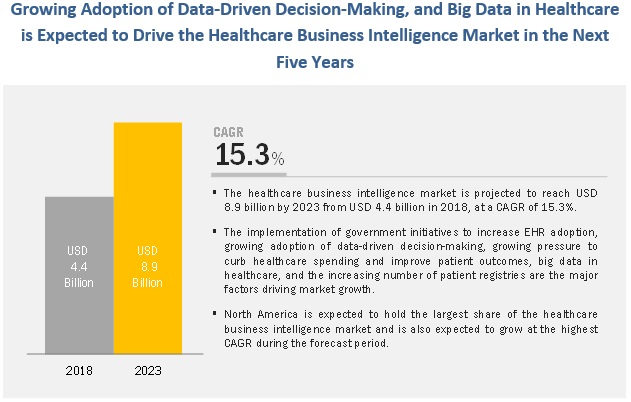The healthcare business intelligence market is expected to reach USD 8.9 billion by 2023 from USD 4.4 billion in 2018, at a CAGR of 15.3% during the forecast period.
The growth of this market is mainly driven by the implementation of government initiatives to increase EHR adoption, growing adoption of data-driven decision-making, growing pressure to curb healthcare spending and improve patient outcomes, big data in healthcare, and the increasing number of patient registries.

The healthcare business intelligence market is highly competative in nature, with several big as well as emerging players vying for market shares.
Prominent players in this market include Microsoft (US), IBM (US), Oracle (US), SAP SE (Germany), SAS Institute Inc. (US), Tableau Software (US), MicroStrategy Incorporated (US), QlikTech International AB (US), Information Builders (US), Sisense Inc. (US), Yellowfin BI (Australia), and BOARD International (Switzerland). These players have adopted various strategies, such as partnerships, agreements, collaborations, and product launches & enhancement to further expand their presence in the global healthcare business intelligence market. Product launches & enhancement have been the key growth strategies adopted during 2016 to 2018, by top players such as Microsoft (US), IBM (US), Oracle (US), SAP SE (Germany), SAS Institute Inc. (US), Tableau Software (US), MicroStrategy Incorporated (US), QlikTech International AB (US).
IBM is one of the leading player in the healthcare business intelligence market. The company’s R&D expenditure increased substantially in 2017 as compared to 2015. This significant investment in R&D is allowing the company to offer innovative solutions such as the Cognos Analytics platform in the market. With an aim to increase its footprint in various sectors, IBM has adopted inorganic growth strategies such as acquisitions, collaborations, and partnerships. For instance, IBM’s partnership with ServiceNow (in 2017) has helped the companies to provide intelligent workflows to their customers. IBM also has a vast partner ecosystem consisting of resellers, MSPs, alliance partners, embedded system partners, and distributors, who help the company deliver efficient and cost-effective solutions to its global customers.
Microsoft is among the key players in the healthcare business intelligence market. The company focuses on strengthening its R&D efforts to reinvent business productivity and build cloud platforms. It also provides its users with economical and convenient products that are integrated with the latest technological solutions and services. Microsoft’s strategy requires it to continuously invest in data centers and other infrastructure that support the latest devices and services. Also, the company invests a substantial amount of its annual revenue in R&D to offer powerful, flexible, secure, and easy-to-use solutions, which are available on a device or via the cloud. Microsoft mainly focuses on product innovation—in the last three years, the company has launched 6 products in the healthcare BI market. The company also adopted inorganic strategies such as acquisitions and partnerships to improve its market share in the healthcare BI market. For instance, the acquisition of Solair, Metanautix, and Datazen has helped Microsoft to enhance its product portfolio and clientele. Also, in March 2018, the company partnered with BlackBerry (Canada) to offer enterprises a solution that integrates BlackBerry’s expertise in mobility and security with Microsoft’s unmatched cloud and productivity products. The company has a very strong partner ecosystem and distributes its offerings through service providers, distributors, OEMs, and cloud resellers.
To Know More @ https://www.marketsandmarkets.com/Market-Reports/healthcare-business-intelligence-market-252368925.html


